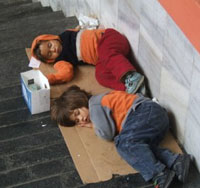Central Committee Public Statement: Integration of Roma in European societies

CEC CENTRAL COMMITTEE
21-24 September 2011
Prague, Czech Republic
The Central Committee of the Conference of European Churches would like to encourage the member churches to make their ministry with and for Roma minorities more visible, and take further steps to overcome barriers between minority and majority communities.
The CEC Central Committee appreciates the adoption of the EU Framework for national strategies for Roma integration by the EU during the Hungarian EU Presidency in June 2011, and wishes to encourage the member and partner organisations to get actively involved in the development of the national strategies.
At its meeting in Prague 21-24 September 2011 the Central Committee met with representatives of the churches in the Czech Republic. In this exchange also the situation of the Roma minority in the Czech Republic was raised; particularly as many of the Roma are living in ghettos in different parts of the country, and concern was expressed about the violence particularly of extremist groups in the
Czech Republic.
Noting that the situation of the Roma minority across Europe remains difficult and efforts need to be strengthened for the integration of Roma and majority populations, the Central Committee of CEC recalls the conclusions of the Bratislava Consultation on “Living in Community - Towards equal opportunities and overcoming discrimination. The situation of Roma in Central and Eastern Europe” of May 2001.
Despite some progress with regard to the legal situation of minorities, social exclusion, stereotypes and discrimination continue. When changes of social legislation is applied, the principle of equality needs to be guiding and misuse be avoided.
The Central Committee commends the efforts and material provided by CCME and Eurodiaconia to this regard. The development of national strategies provide opportunities to overcome exclusion and promote inclusive communities. Let us share our conviction that every person is created in the image of God, and, therefore the dignity of every person – as different as they may be – deserves
respect. Equality before the law, access to social services, education and employment are importantsteps which need to be undertaken as speedily as possible. In addition, bridge building and encounter in society, meeting of minority and majority people are needed for lasting results. We believe churches and church-related organisations can play a unique role in this field, and we hope
they will be recognised for this when national strategies will be developed until the end of this year.
Prague, 24 September 2011

